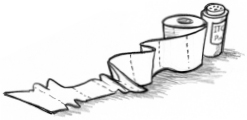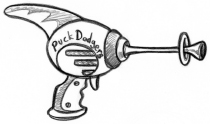The Unusual Mind of Vincent Shadow (8 page)
Read The Unusual Mind of Vincent Shadow Online
Authors: Tim Kehoe

“I could go with him,” Stella offered.
“That’s sweet, Stella, but—”
“No, really. I would like to go. We could stay with Vincent’s Aunt Bonnie.” Stella shot Vincent a look that said, “Let me
handle this,” and Vincent sat back down on the couch.
“Well, I hadn’t thought of Aunt Bonnie,” Norton said.
“What about school?” Vibs asked.
“The registration dinner is Saturday night and the Toy Fair is Sunday,” Vincent said.
“We could fly out Saturday morning and fly back Sunday night,” Stella added.
“Well, I guess it would be okay with me if it’s okay with Aunt Bonnie,” Norton said.
Vincent’s eyes widened. He jumped up and hugged his dad.
“Thanks, Dad,” Vincent said.
“We’d better get on the computer and check airfares,” Vincent’s dad said.
“Oh, Norton, honey. You’ll have to call the airline on the phone. The computer monitor isn’t working.”
“First the DVD player and now this! What’s next?”
22
Eleven-year-old George Spinowski Jr.
was thrilled to learn his toy invention had been accepted into the annual Whizzer Toy contest. But perhaps no one was more
excited by this fact than his father, George Spinowski Sr. To George Sr., the contest was an opportunity for revenge. Revenge
that—in his mind—dated back to 1935.
That summer, Nikola Tesla was in the newspapers recounting his experiments with his earthquake device and death ray machines,
and Parker Brothers released the board game Monopoly. But the invention that changed everything for the Spinowski family could
be found in the bathroom. That is where you would have found Northern’s all new “splinter-free” toilet paper.
On the morning of August 16, 1935, Carl Spinowski walked into the bicycle factory he ran with his brother Mike—George Sr.’s
father—with a roll of Northern’s new splinter-free toilet paper. Mike, a lifelong practical joker, was preparing yet another
one of his pranks involving itch powder when some of the powder accidentally spilled on the roll of toilet paper. That fortuitous
accident forever changed the lives of generations of Spinowskis.

Mike Spinowski instantly realized that itchy toilet paper, sold as a gag gift, could provide the country with the humor it
so desperately needed. So in the fall of 1935, the Spinowski Brothers Bicycle Company became the Spinowski Toy and Novelty
Company. And by the end of 1939, the brothers were selling fifteen million rolls of novelty toilet paper in sixteen different
countries.
Mike died in 1962, leaving the Spinowski Toy and Novelty Company, which was no longer very successful, to his son, George.
George Spinowski was a mean, cruel, vicious man, and running his father’s toy company was the last thing he wanted to do.
But the family was so far in debt that he had no choice. George knew he would have to invent some new toys—and he would have
to do it fast.
George thought about his favorite toys growing up, but the truth was that George hadn’t really liked toys and didn’t really
care much for fun. He did, however, have fond memories of his childhood BB gun, which he used to torment the neighbors.

That fall, Spinowski Toys launched the Puck Dodger BB Blaster. It was a high-powered, large caliber BB gun that looked like
the gun Puck Dodger used each week on his popular TV show. Kids loved Puck Dodger and they loved the Puck Dodger BB Blaster.
The Spinowski Toy Company enjoyed great success for nearly three decades until the spring of 2002, when Whizzer Toys launched
the Whizzer Mega Fizzer and sales of the BB Blaster went in the toilet. George Spinowski vowed he would have his revenge on
Howard Whiz and the Whizzer Toy Company.

George was not a lover of science, but the words “Death Ray” in the newspaper headline caught his eye. And when George Spinowski
read about the upcoming auction of the recently discovered Tesla artifacts, which were rumored to include a death ray device
and an earthquake-generating machine, he was sure his problems were solved. He simply had to outbid the next fellow, and he
would have his next big product.
Surely kids would find an actual death ray much more fun than a Whizzer Mega Fizzer. But George hadn’t counted on having to
outbid Mr. Howard G. Whiz himself. And when Howard raised the bid to ten million dollars, George decided he would have to
come up with “plan B.”
George Sr. found plan B in the newspaper headlines several weeks later, when he read, “Whizzer Toys to Hold Annual Toy Invention
Contest.”
23
“Code sixteen. Code sixteen,” the airport
security guard yelled as he grabbed Vincent’s shirt with one hand and Vincent’s duffel bag with the other. Five or six security
guards immediately surrounded Vincent.
“Please step over here, sir,” one of the guards said.
Sir?
Vincent thought.
I must be in big trouble if they’re calling me “sir.”
“What’s wrong?” Vincent asked.
“Please step over here, sir,” the man said again. He pushed Vincent down in a chair and carefully placed his duffel bag on
a stainless steel table. Now there were over a dozen airport security guards gathered around Vincent’s bag whispering to each
other.

“Excuse me, miss, are you with the boy?” the man asked Stella, who was still standing in line waiting to go through the metal
detector.
“Yes,” Stella said. Stella didn’t need to ask what the fuss was about. She knew.
“Please step to the side, miss.”
Stella took a seat next to Vincent. A crowd of people had gathered, and they were all staring at Vincent and Stella.
One of the guards stepped forward and asked Vincent what was in his bag.
“Oh.” Vincent realized that his homemade invention might have looked suspiciously like a bomb when it was x-rayed.
“It’s just a kite,” Vincent said as he stood up. Two large guards quickly shoved Vincent back in his chair.
“No, no, no, guys, you got this all wrong. It’s just a toy. Really. I entered the Whizzer Toy Contest and I’m taking my kite
to New York,” Vincent said.
“What kind of kite has all those wires?” the guard asked.
“A windless kite,” Vincent said proudly.
“A windless kite?”
“Yeah, a windless kite. As in, it doesn’t need any wind,” Vincent said, confident that the guard would understand.
“Yeah, right,” the guard said.
“No, really. I’ll show you,” Vincent said as he started to stand up, only to be shoved back in his chair by two burly guards.
“Frank, why don’t you check it out,” the guard said to the man standing closest to the bag. Everyone stepped away from Frank.
Frank carefully unzipped the bag.
“Yeah, it kind of looks like a kite,” Frank said.
“All right, kid,” the guard said, “let’s see this windless kite.”
Vincent cautiously stood up. He walked to his bag and took out the kite and the spool of speaker wire.
“You may want to stand back a little,” Vincent warned Frank.
Vincent laid the kite on the floor and walked backward, letting out about ten feet of speaker wire. He looked up and noticed
that a large crowd of people had gathered around him. There were now over a hundred people waiting to see his windless kite.
Most of them looked worried. So did Vincent.
“Here it goes.” The crowd winced as Vincent pushed the green button. Vincent winced, too.
The kite started hissing. Then a few sparks jumped from the guitar string to the shiny kite, and it soared high up into the
air as if it had caught a strong breeze. The crowd gasped. So did Vincent. The kite was glowing blue along the edges. Vincent
let out more wire and the kite soared high in the airport terminal. The crowd was getting larger. One little boy turned to
his dad and asked if Vincent was magic.
Suddenly the kite darted to the left. Then to the right. The kite became a silvery blue blur as it darted here and there.
The crowd started clapping. People were taking pictures. They thought Vincent was putting on a fantastic aerial show. But
Vincent knew something had gone wrong. Something had gone horribly wrong.
The kite was now diving toward the crowd, and the applause turned to screams as people dove out of the way. Vincent pulled
hard on the speaker wire and the kite soared back toward the ceiling. Lightning shot from the tail of the kite to the airport
lights high above the people. The lights burst. Vincent quickly gave the kite slack and it reversed course, darting back toward
the fleeing crowd. Vincent pulled hard on the speaker wire once again, and the kite flew just above the crowd, zapping the
heads of several tall bald men. Vincent reached down and pushed the off button. The kite instantly fell to the floor.
“Sorry. It’s a prototype,” Vincent said with a smile.
24
Howard G. Whiz was thirty-seven years
old when his father died. Even though they hadn’t spoken in years, the news of his father’s death devastated him.
Howard’s father had left no will. So, as an only child, Howard inherited his father’s massive fortune, a fortune built on
young Howard’s inventions. Howard also inherited the Carlisle, a six-story gothic mansion located in the heart of New York
City, across the street from the Metropolitan Museum of Art.
Shortly after the funeral, Howard closed the Whizzer Toy factory and moved into his father’s house. For the next three years
he lived alone on the top floor of the Carlisle. Then, the morning of his fortieth birthday he called four former Whizzer
Toy employees: a computer programmer, an artist, a brilliant physicist named Fayman, and a poet named Earl. He invited this
select group of former employees to a dinner where he unveiled his plans to launch a new and improved Whizzer Toys. Howard
G. Whiz, with the help of his longtime assistant Calli and the four talented employees, launched one of the most spectacularly
successful toy companies in history.
The new Whizzer Toy Company operated for the next forty-three years out of the first five floors of the Carlisle. In his desire
to cut out greedy middlemen, Howard decided to sell his inventions directly to his customers through a catalog called the
Wondrous Whizzer Wishbook. Howard insisted that only “the most amazing magical toys” be included in the Wishbook. He put out
twenty editions over the years, but it had been a long time since the last Wishbook was published, and because of Howard’s
age, many people feared it would be the last.
